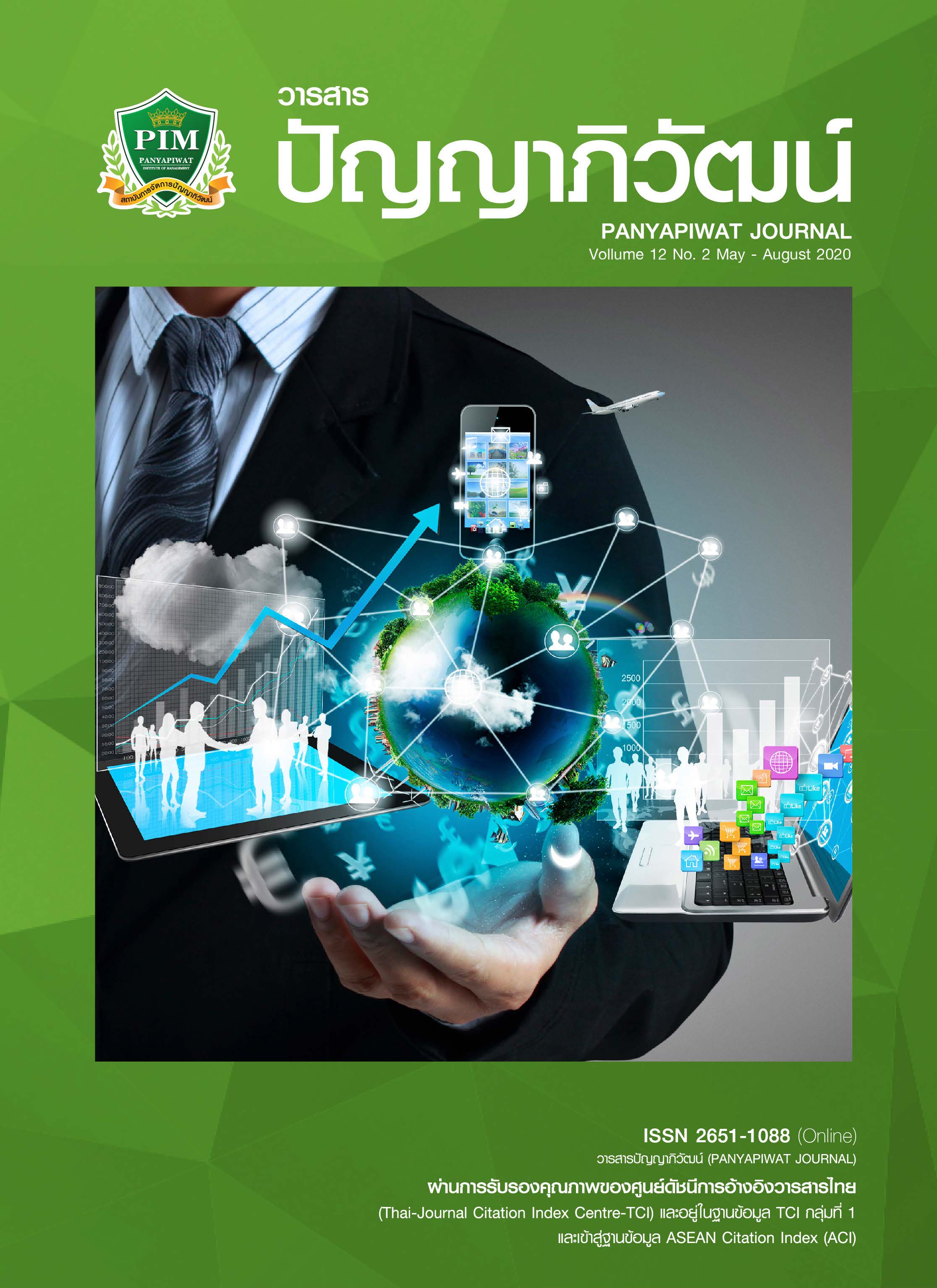การเปลี่ยนแปลงรูปแบบการท่องเที่ยวกับเทคโนโลยีสารสนเทศบนโลกดิจิทัล
Main Article Content
บทคัดย่อ
บทคัดย่อ
ความก้าวหน้าและการพัฒนาด้านเทคโนโลยีอย่างต่อเนื่องส่งผลต่อรูปแบบการใช้ชีวิตของผู้คนในปัจจุบัน ด้วยเพราะการติดต่อสื่อสาร และการเข้าถึงข้อมูลต่างๆ เป็นไปด้วยความสะดวกรวดเร็ว นอกจากนี้ ความต้องการของผู้รับบริการด้านการท่องเที่ยวก็เป็นปัจจัยที่ส่งผลให้แนวโน้มการใช้เทคโนโลยีสารสนเทศเปลี่ยนแปลงรูปแบบการท่องเที่ยว บทความนี้จึงมีวัตถุประสงค์เพื่อนาเสนอรูปแบบการท่องเที่ยวที่มีการเปลี่ยนแปลงซึ่งเป็นผลจากความก้าวหน้าของเทคโนโลยีสารสนเทศในยุคปัจจุบัน โดยเนื้อหาของบทความนี้เกี่ยวกับเทคโนโลยีสารสนเทศที่เพิ่มความสะดวกสบายในการใช้ชีวิตประจาวันของคนในยุคปัจจุบันเป็นอย่างมาก นับตั้งแต่เริ่มต้นวันใหม่ การประกอบอาชีพ และการทากิจกรรมต่างๆ ที่ต้องอาศัยประสิทธิภาพของเทคโนโลยีสารสนเทศเพื่อความรวดเร็ว ซึ่งทาให้คนปรับเปลี่ยนไลฟ์สไตล์ในการดาเนินชีวิต และเกิดการเปลี่ยนแปลงรูปแบบการท่องเที่ยว จากเดิมที่นักท่องเที่ยวมักใช้บริการผ่านผู้ประกอบการธุรกิจนาเที่ยวและมัคคุเทศก์ หรือธุรกิจบริการทางการท่องเที่ยว โดยปรับเปลี่ยนมาท่องเที่ยวแบบอิสระด้วยตนเองมากขึ้นจึงเกิดรูปแบบการท่องเที่ยวแนวใหม่ตามความสนใจพิเศษในลักษณะต่างๆ ได้แก่ การท่องเที่ยวเชิงธุรกิจ (Bleisure Tourism) การท่องเที่ยวเชิงสุขภาพ การท่องเที่ยวโดยรถ การท่องเที่ยวเชิงอาหาร (Gastronomic Tourism) การท่องเที่ยวเชิงศาสนาและจิตใจ เป็นต้น ซึ่งการท่องเที่ยวรูปแบบใหม่นี้ล้วนต้องอาศัยเทคโนโลยีสารสนเทศในการค้นหาข้อมูล ช่วยวางแผนการเดินทางได้ง่ายขึ้น สะดวกและรวดเร็วสอดคล้องกับความต้องการของนักท่องเที่ยวในยุคดิจิทัล โดยการนาเสนอเนื้อหาของบทความนี้จะเป็นประโยชน์ต่อการปรับตัวของธุรกิจด้านการท่องเที่ยวสู่ความยั่งยืนต่อไป
Article Details
“ข้าพเจ้าและผู้เขียนร่วม (ถ้ามี) ขอรับรองว่า บทความที่เสนอมานี้ยังไม่เคยได้รับการตีพิมพ์และไม่ได้อยู่ระหว่างกระบวนการพิจารณาลงตีพิมพ์ในวารสารหรือแหล่งเผยแพร่อื่นใด ข้าพเจ้าและผู้เขียนร่วมยอมรับหลักเกณฑ์การพิจารณาต้นฉบับ ทั้งยินยอมให้กองบรรณาธิการมีสิทธิ์พิจารณาและตรวจแก้ต้นฉบับได้ตามที่เห็นสมควร พร้อมนี้ขอมอบลิขสิทธิ์บทความที่ได้รับการตีพิมพ์ให้แก่สถาบันการจัดการปัญญาภิวัฒน์หากมีการฟ้องร้องเรื่องการละเมิดลิขสิทธิ์เกี่ยวกับภาพ กราฟ ข้อความส่วนใดส่วนหนึ่งและ/หรือข้อคิดเห็นที่ปรากฏในบทความข้าพเจ้าและผู้เขียนร่วมยินยอมรับผิดชอบแต่เพียงฝ่ายเดียว”
เอกสารอ้างอิง
Aree, N., Patarapong, K. & Thongphon, P. (2014). Adjustment under Globalization. SKRU Academic Journal, 7(1), 1-12. [in Thai]
Arunee, I. (2018). Online Travel Business (E-TOURISM). Retrieved November 6, 2019, from http://www.blog.rmutt.ac.th/?p=76
Buddhadasa Archives Foundation Intapanyo and Tourism Authority of Thailand (TAT). Northeast Region. (2014). The Framework for the Promotion of Religious Tourism in the Northeast Region. Bangkok: Tourism Authority of Thailand. [in Thai]
Chalitpun, B. (2018). Cashless Society. Business Review of Huachiew Chalermprakiet University, 10(2), 235-248. [in Thai]
Chitchumnong, A. (2016). Trends and Potential of Information Technology for Tourism. Retrieved November 6, 2019, from https://www.tourisminvest.tat.or.th
Chulalongkorn University Intellectual Property Institute. (2017). Well Being and Health Tourism Industry. Bangkok: Industry and Technology Trends Analysis Report. [in Thai]
Chutchakul, N. (2014). Tourism Industry. Bangkok: Chulalongkorn University. [in Thai]
Danai, J. (2016). Towards Thailand 4.0 era, must revolutionize service with digital innovation. Retrieved November 6, 2019, from https://marketeeronline.co/archives/23702
Global Wellness Institute. (2015). The Global Wellness Tourism Economy Report 2013 & 2014. Retrieved November 6, 2019, from www.globalwellnessinstitute.com
Inkachasarn, A. (2011). Potential Assessment of Wat Klang Koo Wiang Floating Market for Sustainable Tourism. Thesis in Master of Public and Private Management, Silpakorn University, Nakhonpathom. [in Thai]
Import-Export Bank of Thailand. (2016). Kebtokjaktangdaan World Traveling Trends 2016. Retrieved November 6, 2019, from www.exim.go.th/doc/newsCenter/46883
Karnjanawong, P. (2008). Tourism and Internet. Retrieved August 10, 2020, from http://lms.mju.
ac.th/courses/631/locker/content/%E0%B8%9E%E0%B8%97%20335/td335/chapter6/chapter6_3.htm
Keainwatthana, K. (2018). Situations and Trends of World and Thailand Health Tourism. Journal of Culture, 19(35), 77-87. [in Thai]
Mayer, M. (2012). Study of Motivations and Satisfactions of Thai Tourist to Pornrung Hot spring, Ranong Province. Bangkok: National Research Council of Thailand. [in Thai]
Michelin Guide. (2018). MICHELIN Guide Selections. Retrieved November 6, 2019, from https://guide.michelin.com/th/bangkok/michelin-guide-inspectors
Ministry of Tourism and Sport. (2016). Tourism Economic report. Retrieved November 15, 2019, from https://www.mots.go.th/ewt
Neilson & Alipay. (2018). Trend of Chinese Oversea Tourist’s year 2017. Retrieved November 6, 2019, from https://techsauce.co/news/outbound-chinese-tourism-and-consumption-trends-2017-survey
Nited, T. (2008). Social and cultural change. Bangkok: Publisher of Chulalongkorn University. [in Thai]
Office of the Permanent Secretary for Tourism and Sports. (2016). World Tourism Situation. Bangkok: Report of Tourism Economy. [in Thai]
Paypal payment system (Paypal). (2016). The Focus of Thai’s Tourists Behavior of digital Age. Retrieved November 15, 2019, from https://www.marketingoops.com/reports/behaviors /paypal-travel-insight-thai/
Phanthida, L. (2016). Guidelines for the development of religious tourism to support tourists in the retirement community Kanchanaburi. Independent study Master Degree, Faculty of Business Administration, South East Asia University. [in Thai]
Phongphanarat, K. (2015). Overview of situations and trends of global tourism development in ASEAN and Thailand. College of Innovation Thammasat University. [in Thai]
Prachachart. (2018). 2018 Travelling Trend that Drive the global economy. Retrieved November 15, 2019, from https://www.prachachat.net
PramahaArphakaro, S. et al. (2011). Format and Learning Network of Temple Tourist Sites in Thailand. Digital Research Information Center, National Research Council of Thailand (NRCT). [in Thai]
Ratirita. (2019). The Millennials, the main consumer in the tourism market. Retrieved November 23, 2019, from https://www.positioningmag.com/1248732
Rodjanakitaumnuey, S. (2013). Thai Electronic Tourism. Journal of Business Administration, 36 (139), 12-26. [in Thai]
Sawetarun, P. (2018). Press release of the Thai tourism situation. Bangkok: Ministry of Tourism and Sport 2018. [in Thai]
Sayamol, W. (2012). The future of technology in the tourism industry. TAT Review. Retrieved November 19, 2019, from http://www.etatjournal.com/mobile/index.php/menu-read-tat/menu-2012/menu-2012-jan-mar/60-12555-futute-technology
Sitthanon, K. & Phajaknate, P. (2015). Online media usage patterns and intention of buying tourism products and services of Thai tourists. Journal of Communication and Management NIDA, 2(1), 1-17. [in Thai]
Tantikorn, K. (2012). Thai tourists behavior in religious studies Birthday relics Nakhon Phanom Province. Independent study Master Degree, Faculty of Management Science, Khon Kaen University. [in Thai]
Thailand Tourism Directory. (2018). The trip. Retrieved November 23, 2019, from https://thailandtourismdirectory.go.th/th/content/page/detail/itemid/96
Thailand’s Tourism Marketing Research Center. (2017). World Traveling Statistic Report. (Voice TV, 2018). Retrieved November 23, 2019, from https://www.voicetv.co.th/read/49831
Toothongkam, T. (2018). The Changes of Trends and Social Context. Retrieved November 23, 2019, from https://www.stou.ac.th/Schoolnew/polsci/UploadedFile.pdf
Tourism Authority of Thailand. (2018). Global tourism statistics report. Retrieved November 23, 2019, from https://www.voicetv.co.th/read/498316
Ulrich, Z. (2016). Concept for Thailand in entering the digital age. Retrieved November 23, 2019, from https://blogs.worldbank.org/th/eastasiapacific/ideas-for-thailand-digitaltrans formation
UNCTAD. (2012). Trade and Development Report 2012. UNCTAD United Nations Conference on Trade and Development. Retrieved November 30, 2019, from http://www.mfa.go.th/ business/th/cooperation/252/16503
United Nations World Tourism Organization: UNWTO. (2017). Digital 4.0, when the world is driven by technology. From WICE Logistics Public. Retrieved November 30, 2019, from www.wice.co.th/2018/01/11/digital-4-0-technology/
Vorasuvich, P. (2018). The Context and Operation Guidelines for Digital Tourism Business. Rajapark Journal, 12(26), 255-269.
Waraporn, D. (2019). Social Media for Teaching and Learning in the 21st Century. Journal of Liberal Arts Maejo University, 7(2), 143-159.
Wangrat, W. (2018). Project of Window to Lanna Tourism: Food and Health Tourism. Tourism Research and Development Center. Social Research Institute, Chiang Mai University.
Wice Logistics. (2018). Digital 4.0, when technology has a brain. Retrieved November 30, 2019, from https://www.wice.co.th/2018/01/11/digital-4-0-technology/


